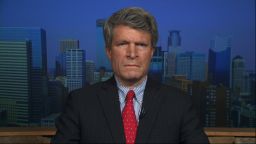Editor’s Note: Richard Painter is the S. Walter Richey Professor of corporate law at the University of Minnesota Law School. Formerly he was the White House ethics lawyer during the George W. Bush administration and was a candidate in the Democratic primary for US Senate from Minnesota. The views expressed here are solely his. View more opinion articles on CNN.
In my experience, it is almost unheard of for the White House, much less the president individually, to be involved in deciding whether, how and when to build a new government building. Such matters are usually worked out by the agency or entity that wants the new building and the General Services Administration, and then taken further in the appropriation process as Congress allocates funds for the new building. Such matters usually do not involve the president.

However, in a report released this week, the Office of the Inspector General for the GSA suggested that GSA Administrator Emily Murphy’s answers about President Donald Trump’s potential involvement in changing construction plans for a new FBI building were “incomplete” and possibly misleading. Murphy avoided mentioning, when Congress asked three months after the fact, Trump’s involvement. Of particular interest is a January meeting to discuss the FBI’s deteriorating headquarters; Trump’s assembled advisers met and decided to rebuild (not relocate or renovate) the building. Not coincidentally, that construction as originally planned would relocate the FBI away from its current location across the street from Trump International Hotel in Washington.
Congress has already allocated funds for this proposed new building for the FBI (an agency about which Trump has not been shy in expressing his feelings). Controlling the future of the FBI’s new building for this President is not only a way to protect his precious hotel – it’s also a way for Trump to assert dominance over the FBI.
Indeed the GSA inspector general report revealed that Trump was far more involved in deliberations over the new FBI headquarters than Congress was originally told. Apparently the President was involved in a decision to abandon plans – already approved by Congress – to vacate the J. Edgar Hoover FBI Building across from the Trump hotel on Pennsylvania Avenue, and move the FBI to a location in Maryland or Virginia. It is not clear what will happen, but the result of Trump’s interference is almost certain to delay, perhaps for a few years, the FBI’s proposed move out of the Hoover building.
And that of course is to the benefit of Trump. Trump’s being in the White House is what drives up room rental and restaurant prices in the hotel in the first place. He is almost certainly averse to large-scale moving and demolition work being done in the neighborhood, at least while he is in office. Trump obviously has a strong economic interest in having government buildings around his hotel and in not reducing its attractiveness (with construction and the like) as a preferred venue for lobbyists, US government officials and foreign government officials during his term in office.
This is yet one more reason the president should not own a hotel or other businesses in Washington. When we elect a president to preside over a trillion-dollar federal budget, we don’t expect him to be moonlighting as an innkeeper on the side.
Any other federal employee in the executive branch (except the president and vice president) is subject to the criminal financial conflict of interest statute,18 USC 208, which prohibits participation in government matters that have an effect on the federal employee’s financial position. Under that statute a federal official probably would be required to recuse himself or herself from any government decision about what to do with a government building so close to a hotel that was owned by the government employee or spouse. Participating in deliberations over such a government matter in that situation would likely be a federal crime.
Previous presidents have complied with this measure anyway, but Trump and his lawyers repeatedly remind us that he is exempt from this statute. Congress has for months had chances to hold the President accountable for his financial conflicts of interest, either by conducting investigations or by amending the conflict of interest statute to include the president, the vice president and members of Congress. Congress has failed to do so, in part because almost all of the Republicans are beholden to Trump and in part because several members of the House and Senate (Democrats and Republicans) are laden with pharmaceutical and medical device stocks, energy stocks and other investments that pose potential conflicts of interest.
The president should be subject to the same financial conflict of interest rules as everyone else, and government agencies, including the FBI, should be protected from retaliation by a president who is angry with them for simply doing their jobs.
But those who live in glass houses don’t throw stones, and certainly won’t throw stones at the Trump hotel. So Trump gets away with conflicts of interest that, to ordinary citizens appear to be, and are, intolerable.
Add to this the fact that this President will do anything to retaliate against the FBI because of the Russia investigation (never mind that former FBI Director James Comey virtually handed Trump the election by writing an inflammatory and unnecessary late October 2016 letter to Congress about Hillary Clinton’s email). The message may be simple: If the FBI wants that fancy new building in the suburbs, closer to housing stock affordable on the typical government salary, the FBI had better focus on something other than Russia.
So here we see yet one more reason why members of Congress from both houses and both sides of the aisle need to take a break from watching their own investment portfolios, stop worrying about whether standing up to this President will make them politically popular or impress their political action committee donors, and do something to protect the integrity of our government.


